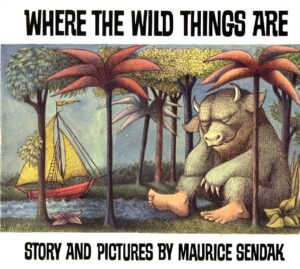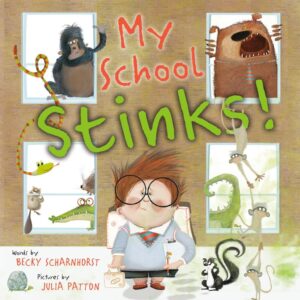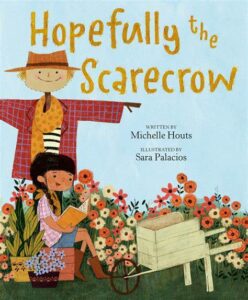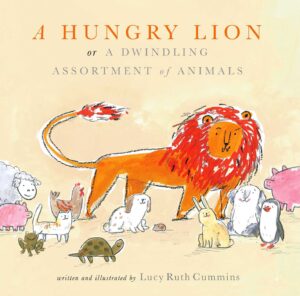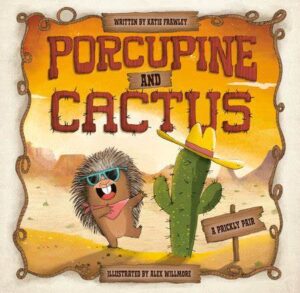Thanks to guest interviewer Joyce Uglow for handling this month’s interview with Becky Scharnhorst!
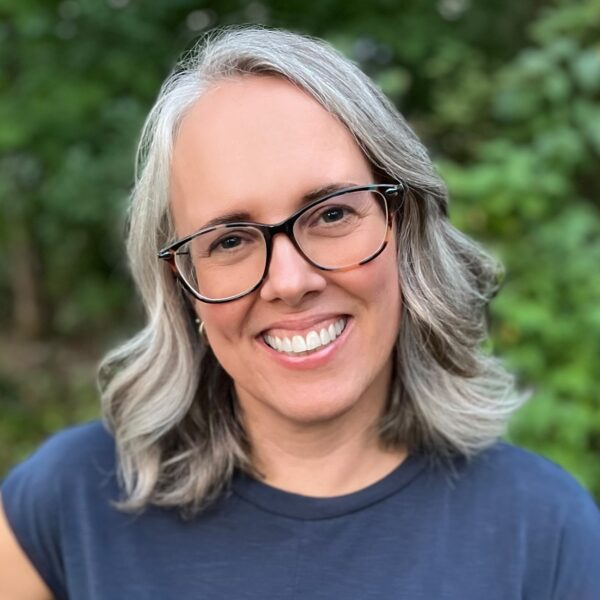 Becky grew up in Northeast Wisconsin and spent most of her childhood playing in lakes and reading books. Shortly after graduating from Luther College, Becky spent a year working as a children’s bookseller and soon discovered she enjoyed reading picture books more than anything else. Now Becky spends her days writing children’s books and working at her local library. When she’s not reading or writing, Becky can be found hiking through the woods, baking something sweet, or thinking happy thoughts. She currently lives in Central Wisconsin with her husband, two kids, and a few too many pets.
Becky grew up in Northeast Wisconsin and spent most of her childhood playing in lakes and reading books. Shortly after graduating from Luther College, Becky spent a year working as a children’s bookseller and soon discovered she enjoyed reading picture books more than anything else. Now Becky spends her days writing children’s books and working at her local library. When she’s not reading or writing, Becky can be found hiking through the woods, baking something sweet, or thinking happy thoughts. She currently lives in Central Wisconsin with her husband, two kids, and a few too many pets.
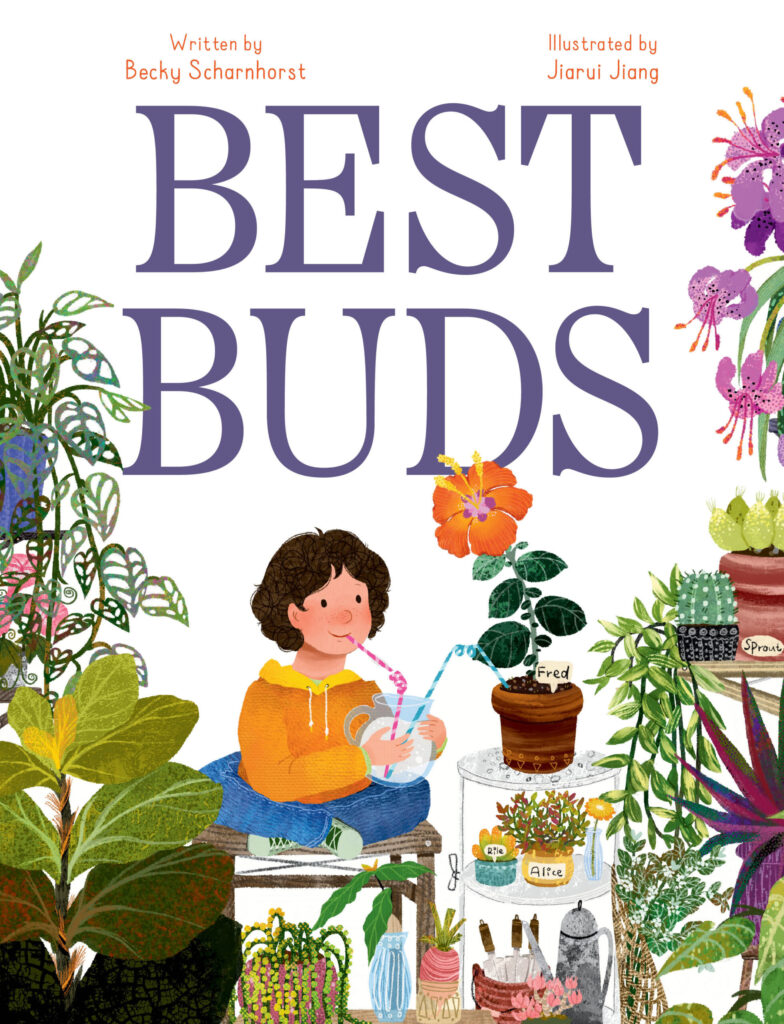 JPU: Best Buds is the most adorable book on earth, and I simply cannot wait for its release on July 8, 2025. Please share what you see as the power Best Buds can have on young readers. What do you hope will speak to kids?
JPU: Best Buds is the most adorable book on earth, and I simply cannot wait for its release on July 8, 2025. Please share what you see as the power Best Buds can have on young readers. What do you hope will speak to kids?
BS: Thank you so much for your kind words about Best Buds! I’m thrilled to hear it resonated with you. My hope is that after reading this story young readers will feel empowered to trust themselves and to embrace their own unique self. In this story, Spencer is confident in who he is and in his choice of friends. He knows what qualities he’s looking for and he finds friends who have them. Even when others question him, he remains true to himself and his chosen friends. I hope young readers feel equally confident in who they are, and I hope it makes them consider what qualities are important to them when it comes to friendship.
 JPU: Booklist had this to say about your picture book My School Stinks. “Along with being a good choice for children anxious about their first day, this offers a nifty exercise in reading between the lines. What is your favorite read between the lines in Best Buds?
JPU: Booklist had this to say about your picture book My School Stinks. “Along with being a good choice for children anxious about their first day, this offers a nifty exercise in reading between the lines. What is your favorite read between the lines in Best Buds?
BS: There is a spread near the beginning where Spencer learns he can buy plant friends at the farmers’ market. The text reads “On a trip to the farmers’ market, Spencer discovered he could even buy friends, though something didn’t feel quite right about that.”
I love that line because it works on two different levels. Children will think it’s funny even if they don’t understand the hidden meaning behind that phrase because they know you can’t buy friends at the store or market. But older children and adults who do understand the meaning behind the phrase “buy friends” will know that the text is also saying something about the true nature of friendship.
JPU: Friendship. As a principal, I often gathered small groups for special friendship lunches. It would have been great to have a garden at our school to plant friendships. New ideas for picture books come to me when I’m traveling. Does inspiration strike you when you’re at home, on vacation, at work, or other places?
BS: That’s an interesting question. I was going to say all of the above, but when I started going through my list of books and ideas, I realized most of them came to me when I was at home. I’m guessing that’s because home is where I’m most comfortable and where I can most easily quiet my mind. That said, I have worked out a lot of story problems while hiking, so the forest is another place of inspiration for me.
JPU: Home is where the heart is, right? Speaking of traveling, This Field Trip Stinks is hilarious! In contrast, I think the jokes in Best Buds are more subtle. Is there a line or a spread that makes you giggle?
 BS: The spread that makes me giggle the most is the one where Spencer discovers he can buy friends at the farmers, market. However, a close second is the one where Spencer takes his plant friends to various locations. All of Spencer’s lines on that page make me laugh, but I especially love the one that comes right after the librarian comments on how many friends he has brought to story time. Spencer casually replies, “Don’t worry. They’re much quieter than Jeremy.”
BS: The spread that makes me giggle the most is the one where Spencer discovers he can buy friends at the farmers, market. However, a close second is the one where Spencer takes his plant friends to various locations. All of Spencer’s lines on that page make me laugh, but I especially love the one that comes right after the librarian comments on how many friends he has brought to story time. Spencer casually replies, “Don’t worry. They’re much quieter than Jeremy.”
JPU: There is that travel theme again… I do love a busy farmers market where I can replenish my pantry with special honey, plants, and bread. Picture books are extraordinary treasures in of themselves. It’s well known that great teachers use picture books for enhancing their students’ learning. Your extension activities, discussion guides, and resources are super fun and helpful. In your opinion, what are the important features in a tool for teachers, caregivers, and/or parents?
BS: I think one of the most important features is that the tools are easy to access and easy to use. Parents, teachers, and caregivers are usually quite busy, so if the activities you are providing require a lot of extra prep or materials, they likely won’t get used at all. I also think it’s important the activities are fun for kids. Having curriculum tie-ins is an added bonus, but I think it’s okay if the activities you provide are purely for fun. We are writing for children, first and foremost, so when creating resources, we need to keep that in mind.
JPU: Here’s one to make you think outside the box. If you were on a panel of kidlit writers talking about platform, what would the audience members be surprised to hear you say?
BS: I laughed out loud when I read this question because I can’t imagine any scenario where I’d be asked to be on a panel talking about platform. This is one of the areas where I struggle the most. I don’t know if I could even describe my platform, though I probably shouldn’t admit that. I admire people who excel at marketing and branding, but I am not one of them. Probably some of that stems from my mixed feelings about social media. I tend to be a rather private person, so I don’t feel comfortable sharing a lot about myself online. At the same time, I want my online presence to be real and authentic, so it’s a struggle to find that balance. The audience might be surprised to hear me say that I’m still figuring it out. Or, maybe that’s obvious after taking a look at my online presence.
JPU: I don’t know about that, Becky. I see you as someone who stands on the nature platform very well. So, how about your super writer power? How do you kick it into gear when creating an intriguing title with hooks that attracts book buyers?
BS: You’re really digging into to all my weaknesses, Joyce! I am embarrassed to admit that I only came up with one of the titles for my books. I do not have a superpower when it comes to clever titles that will attract book buyers. What I do have are brilliant critique partners who are masters at wordplay! My friend Tara Hannon came up with the title for Best Buds and it is utter perfection. Laura Lavoie is another writing friend of mine who is so good at coming up with catchy titles and concepts. She wrote an excellent blog post about titles that I still refer back to when brainstorming. Titles are hard for me!
What I usually do is write a list of words and phrases that are associated with my manuscript. Then, I come up with a list of terrible titles using those words. After that, I send the list to my smarty pants critique partners and they usually come up with the perfect title. I’ve also had titles changed by my editor. So, I guess my superpower is surrounding myself with geniuses!
JPU: I agree! Critique partners, editors, and fellow writing community members enrich what we do. I’ve been known to lose myself in research because a news article spurs me to dig into a topic. What is the best rabbit hole you got lost in?
 BS: Octopus camouflage! Even though How to Get Your Octopus to School is a fiction book, my editor wanted me to include some facts about octopuses in the back. I thoroughly enjoyed researching these incredible creatures and especially learning more about their impressive camouflage. I don’t think I want to know how many hours I spent watching octopus camouflage videos.
BS: Octopus camouflage! Even though How to Get Your Octopus to School is a fiction book, my editor wanted me to include some facts about octopuses in the back. I thoroughly enjoyed researching these incredible creatures and especially learning more about their impressive camouflage. I don’t think I want to know how many hours I spent watching octopus camouflage videos.
JPU: I have to admit that EVERY time I see an article, video, or book about an octopus, I think of you. Name a children’s book from your childhood that you wished you had written. What makes it special and unique?
 BS: I loved The Monster at the End of This Book as a child and I still love it today. I think one of the things that makes it special is that it’s interactive. There are a lot of interactive books out now, but I can’t think of any others from my childhood. Also, the page turns are epic! Young readers cause ropes to snap and brick walls to tumble with the mere flip of a page. It’s empowering and hilarious! It also has one of the best endings ever! It’s silly, surprising, and completely satisfying.
BS: I loved The Monster at the End of This Book as a child and I still love it today. I think one of the things that makes it special is that it’s interactive. There are a lot of interactive books out now, but I can’t think of any others from my childhood. Also, the page turns are epic! Young readers cause ropes to snap and brick walls to tumble with the mere flip of a page. It’s empowering and hilarious! It also has one of the best endings ever! It’s silly, surprising, and completely satisfying.
JPU: I need to dig that one out again. Jon Klassen and Mac Barnett just wrote an in-depth analysis of Go, Dog. Go! on their SubStack Looking at Picture Books. Those older books are sure different from what is getting published today. What is the best advice you can give to a new kidlit writer?
BS: Focus on your craft. There are many excellent resources available to new writers, and a lot of them are free. So, do some research. Read current books. Take a class. Get some feedback. Revise. Revise. Revise. Always be diligent about your craft. And if you can, find yourself some brilliant critique partners.
JPU: Thanks, Becky. Let’s jump into the Speed Round. What is your One Little Word for 2025?
BS: I didn’t choose a word for 2025, but I am trying to be more deliberate about rest.
JPU: Ah ha. REST. It is a radical act… I need more of that! Are you a book buyer or library user? Both!
BS: I admit to spending way too much money on picture books. But then I have gifts I can give. I do love a good library stack, too.
JPU: What’s funnier? A well-crafted joke or a surprise?
BS: Most well-crafted jokes have an element of surprise to them, so I’m not sure how to answer. Can I say both again?
JPU: Now I’m going to have to reread your books to see which technique you use the most. Are you a “pantser” or a “plotter” when writing picture books?
BS: Plotter! I usually spend weeks or months thinking about a project before I put any words on the page.
JPU: Wise. Becky, you’re very wise. What do you have in the publishing pipeline?
BS: I recently received some exciting news, but I’m not allowed to share the details yet. Hopefully I can spill the beans soon!
JPU: NO! I’m not good at waiting… You get THE call from THE children’s book awards committee, what’s your reaction?
BS: Based on the reaction I have whenever my agent calls with good news, I’d say lots of screaming and jumping around. I am the opposite of chill in those situations.
JPU: Thank, Becky. I know for a fact that kids all over will fall in love with Best Buds. I know I did.

